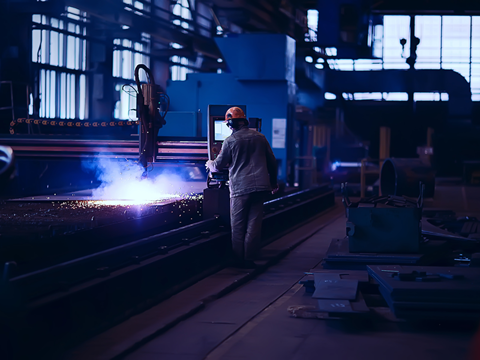
All sub-sectors of the German aluminium industry experienced declines in production in Q1 2024, Aluminium Deutschland warns, with energy costs remaining high; recycled aluminium is thought to have decreased by 7%, while third-country imports have impacted the extrusion sector.
Despite the role recycled aluminium in Europe’s decarbonization efforts and the resultant market potential, Aluminium Deutschland records that 685,000 tons of recycled aluminium were produced in Germany between January and March.
Semi-finished aluminium production reportedly decreased by double digits in some cases, reaching a total reduction of 6% at just over 571,000 tonnes. Within this, rolled aluminium products apparently underwent a ‘comparatively moderate decline’ of 5% to approximately 448,000 tonnes – a contrast to extruded products, which reached 124,000 tonnes in a 13% drop.
In the aluminium extrusion sector, German manufacturers state that third countries, especially Turkey, are applying competitive pressure. Today’s largest importers to Germany are Turkish, Aluminium Deutschland states, with a market share of around 10% in recent years.
While their market share in Germany was said to be just under half ten years ago, German manufacturers’ market share is recorded as a third in Q1 2024.
“High energy costs and the overall tense economic situation in Germany continue to hit manufacturers hard,” explained Rob van Gils, president of Aluminium Deutschland. “Demand from important customer industries - especially from the construction industry - remains at a low level.
“Added to this are the weak registration figures for electric cars as a result of the federal government’s overnight cancellation of funding.
“We do not shy away from competition and are in favour of free trade. German industry depends on open markets like hardly any other. But competition must take place on fair terms.
“The flood of imports from Turkey at least raises questions about a level playing field. It is not without reason that the USA has initiated an anti-dumping procedure here. State interventions can affect energy supplies, financing conditions or tax breaks.
“In addition, Turkish extruders benefit from cheaper access to Russian primary metal, while we are making every effort to become independent of it - this alone is morally highly questionable.”
After reporting a ‘sharp decline’ in German aluminium production in Q3 2023, in which the production volume of primary aluminium almost halved, Aluminium Deutschland shared its ‘cautious’ optimism that the industry would progress in 2024 – citing increases in tube and aerosol can deliveries by 4% and 0.5%, respectively, between 2022 and 2023.
However, it also feared that high energy costs, economic recession, and over-regulation would have an adverse effect on the German aluminum industry. Germany was said to have been the largest primary aluminium producer in the EU until 2021; now it fears for its future as an industrial location for aluminium.
If you liked this story, you might also enjoy:
How are the top brands progressing on packaging sustainability?
The ultimate guide to global plastic sustainability regulation














No comments yet